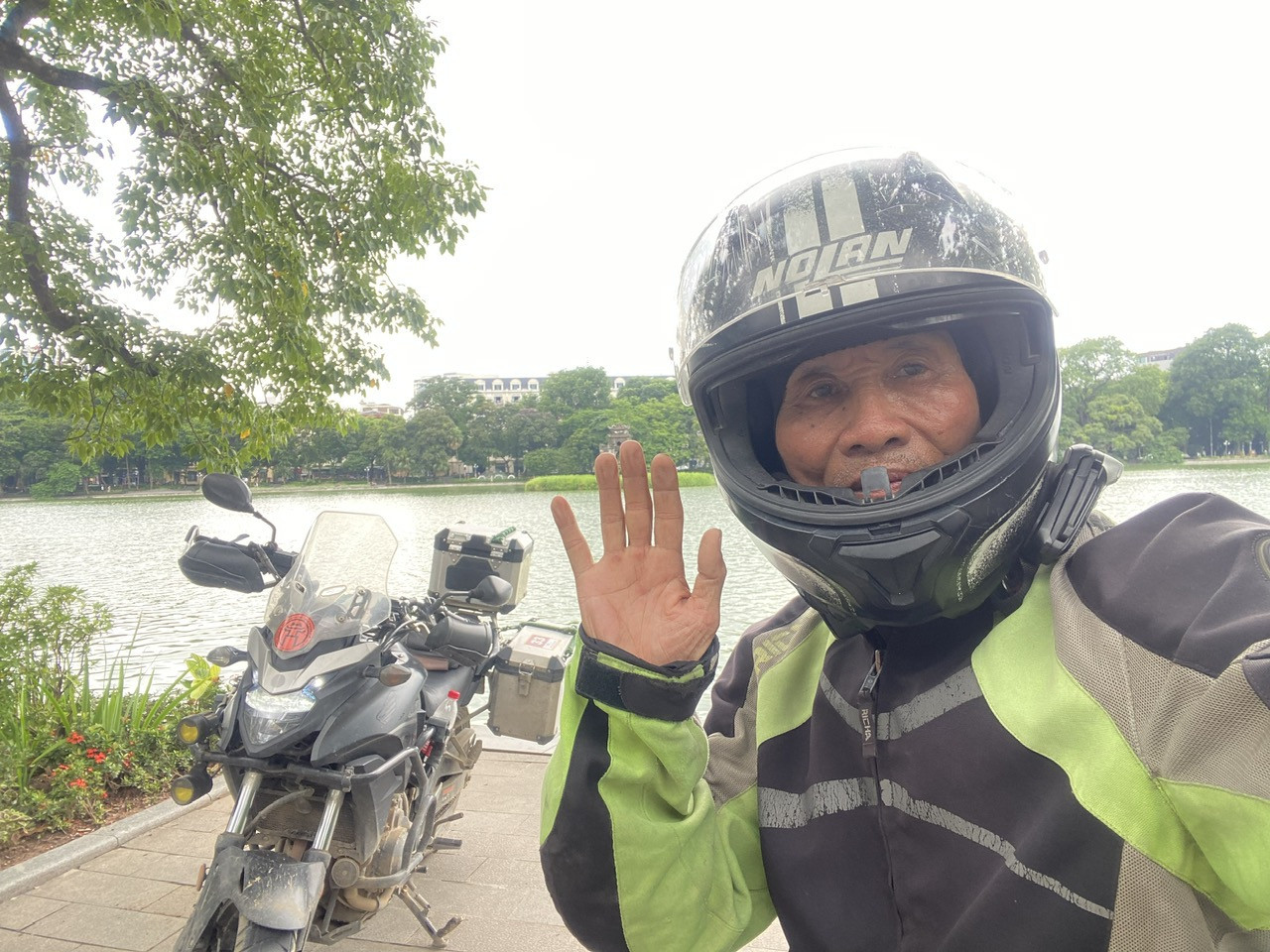
At 3 PM on July 24th, Tran Le Hung, a 71-year-old adventurer from Hanoi, returned to Hoan Kiem Lake after completing a 41-day journey through Tibet, China, covering an astonishing 13,785 kilometers.
Upon his return, Mr. Hung indulged in his favorite ice cream by the lake, took a celebratory photo, and posted it on social media to announce his safe return. Afterward, he quickly changed and headed to the Red River for a swim - a ritual he has maintained for decades, regardless of the season. "This is how I reconnect with daily life after a long and arduous adventure," he said.
"My trip was a complete secret. Other than my guide, not even my wife and children knew I was heading to Tibet. In China, I couldn’t access social media, so I had to pause communication with everyone," Mr. Hung revealed.
Mr. Hung is a well-known figure in Vietnam’s travel community. In 2019, at 66, he embarked on a transcontinental motorcycle journey across Asia and Europe, traversing 39 countries and territories over six months.
The adventurer, who stands at 1.6 meters tall and weighs less than 50 kilograms, covered a distance of 45,000 kilometers on his "iron steed." He braved sandstorms in Xinjiang, China, endured 40-degree Celsius heat, and navigated the rugged Tossor Pass, nearly 4,000 meters high in Kyrgyzstan, with sheer cliffs on one side.
"I’ve lost count of how many times I fell off my bike during that trip," Mr. Hung recounted.
A secret journey to conquer Tibet
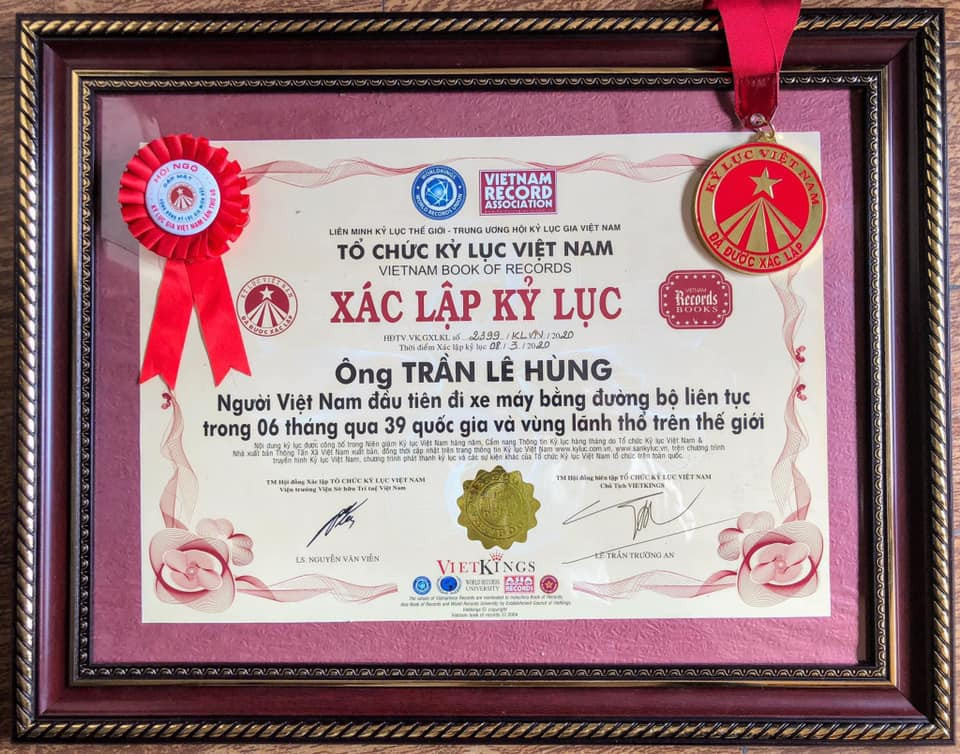
Mr. Hung’s transcontinental journey was driven by a desire to revisit his old school in Georgia, where he studied automation. However, his recent trip to China was fueled by a longing to explore the vast country with its rich and diverse culture - a place he had only glimpsed on his previous journey.
"In 2019, I didn’t have much experience riding a motorcycle, so I was entirely focused on the road, not daring to take in the scenery. This left me with a sense of regret and a deep desire to return to China to explore its nature and culture further," Mr. Hung explained.
Over the past five years, Mr. Hung has continued to swim regularly and practice meditation to maintain his endurance. In 2020, he took his wife on a cross-country trip to Ca Mau over 20 days. At the time, he was 67 years old, and his wife was 66.

As the oldest member of Hanoi’s motorcycle club, Mr. Hung rarely misses any trips. Alongside other club members, he has ventured to Cao Bang, Ha Giang, and ridden continuously from Hanoi to Quang Tri, supporting cycling and running races across various provinces.
"Compared to five years ago, at 71, I still feel physically fit, mentally sharp, and more confident in my riding skills. Practice makes perfect, as they say. That’s why I felt confident about conquering Tibet—a route known for its extreme challenges, testing even the most seasoned adventurers," Mr. Hung shared.
During his transcontinental journey, Mr. Hung was guided by Ha, an experienced tour guide. After returning from that trip, Mr. Hung occasionally mentioned his desire to explore China with Ha.
At the beginning of June, Ha informed Mr. Hung about a group of Vietnamese travelers planning a road trip to Tibet by car. When Ha proposed that Mr. Hung join them on his motorcycle, the group leader, familiar with Mr. Hung's reputation as a seasoned adventurer, agreed. Mr. Hung and Ha would ride their motorcycles alongside the group, provided they adhered to the schedule and regulations.
"I didn’t hesitate to agree, no matter the cost," Mr. Hung said.
 |
 |
However, time was tight, and Mr. Hung had less than ten days to prepare. "I had to renew my passport, apply for a visa, undergo a health check-up to purchase international insurance, and obtain the necessary permits for Tibet. Given the tight schedule, I was mentally prepared that if I couldn’t make it in time, I would consider it not meant to be," Mr. Hung explained.
Fortunately, Mr. Hung completed the paperwork at the last minute.
Before leaving, he only told his family that he was going on a short trip with friends. The 71-year-old adventurer explained, "This was a long journey with many challenges and risks, so I didn’t want to make promises I might not keep. I carried out the trip in secret, not telling anyone."
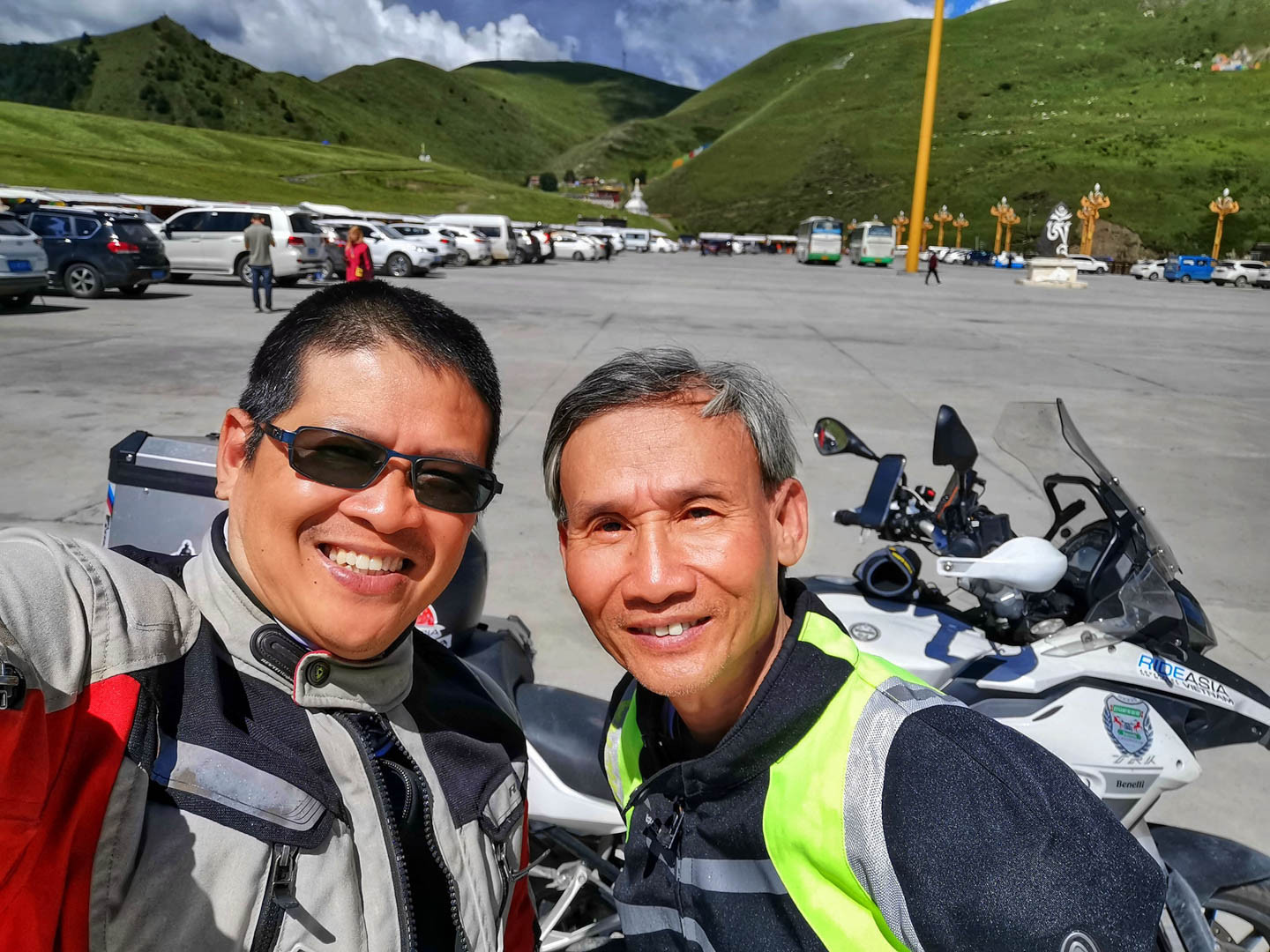
To travel by motorcycle into China, Mr. Hung had to go through Laos. The road to the Laos-China border was rough and muddy, making the journey difficult. On many stretches, Mr. Hung had to stand while riding. It took Mr. Hung and Ha four days to reach the Laos-China border.
In 2019, Mr. Hung had an accident while crossing the Laos border. He took a corner too wide and lost control of the handlebars. To avoid going over the edge, he had to crash into a roadside marker. The bike’s front fork broke, the tire came off the rim, and Mr. Hung was thrown off the bike.
"This time, I had much more experience. Of course, the more experienced I am, the more careful I am. I don’t let my guard down," Mr. Hung asserted.

When Mr. Hung arrived in Yunnan, China, his daughter-in-law called to check in. That was when the family discovered he had traveled to China. "Even then, I didn’t reveal where I was going or how long I would be gone. I reassured my children that I was on a safe trip and gave them Ha’s contact information in case they needed to reach me.
Since I hadn’t done enough research, I didn’t set up internet access or social media apps in China, so I couldn’t communicate with my family," Mr. Hung explained.
A grueling journey
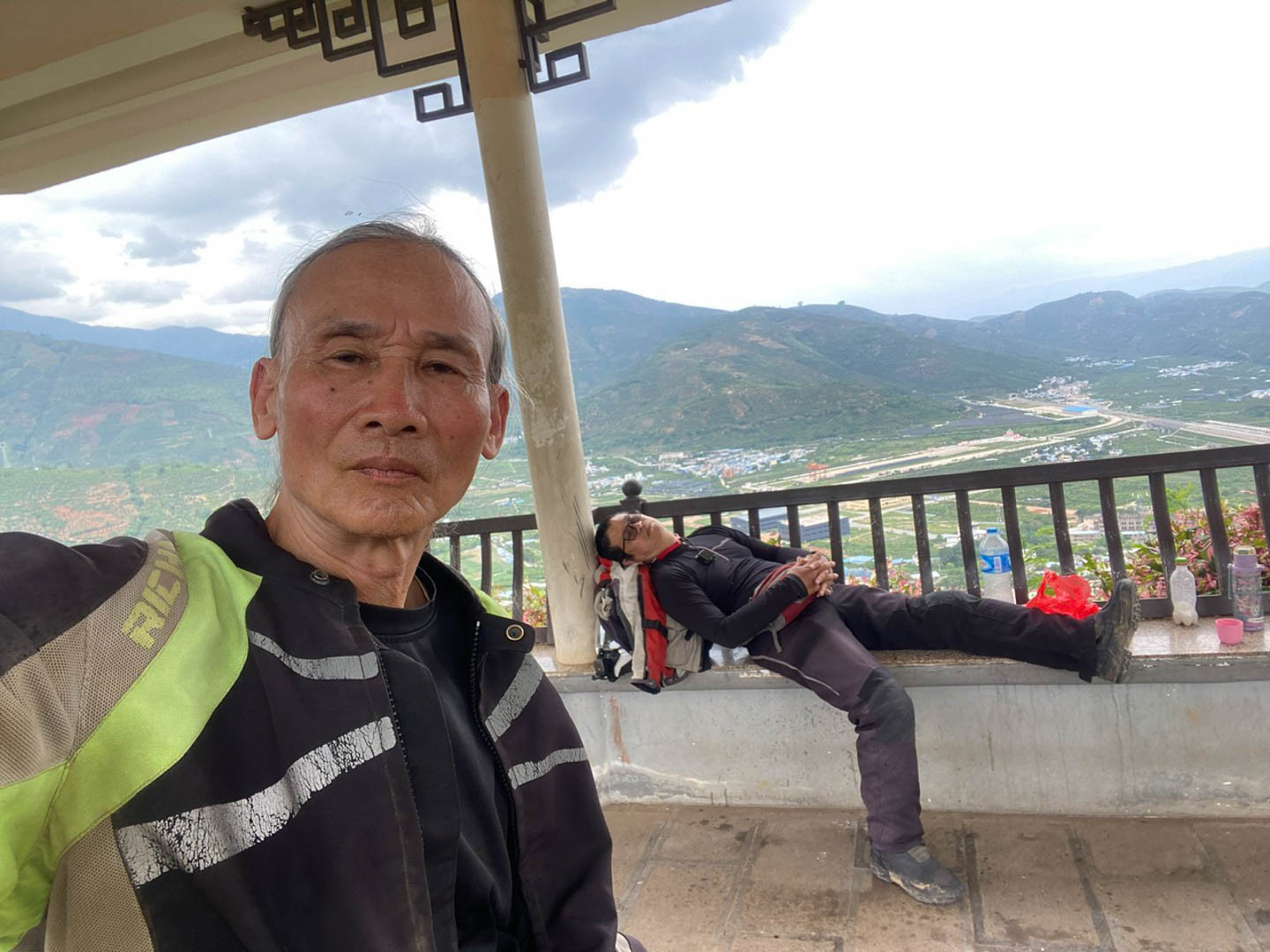
According to the schedule, the group would travel through several western provinces of China, including Yunnan, Guizhou, Chongqing, Shaanxi, Gansu, Qinghai, and the Tibet Autonomous Region.
"Cars and motorcycles travel at different speeds, and the routes are also different. The cars took a mix of highways and national roads, while Ha and I stuck to national roads to enjoy the villages and explore local cultures.
However, we had to stick to the schedule, meeting up with the group at the designated hotel each evening. The next morning, we would complete the necessary procedures before continuing," Mr. Hung explained. "Because of this, there were days when we rode continuously for 22 hours."
The most challenging part of the journey was crossing Semo La Pass.
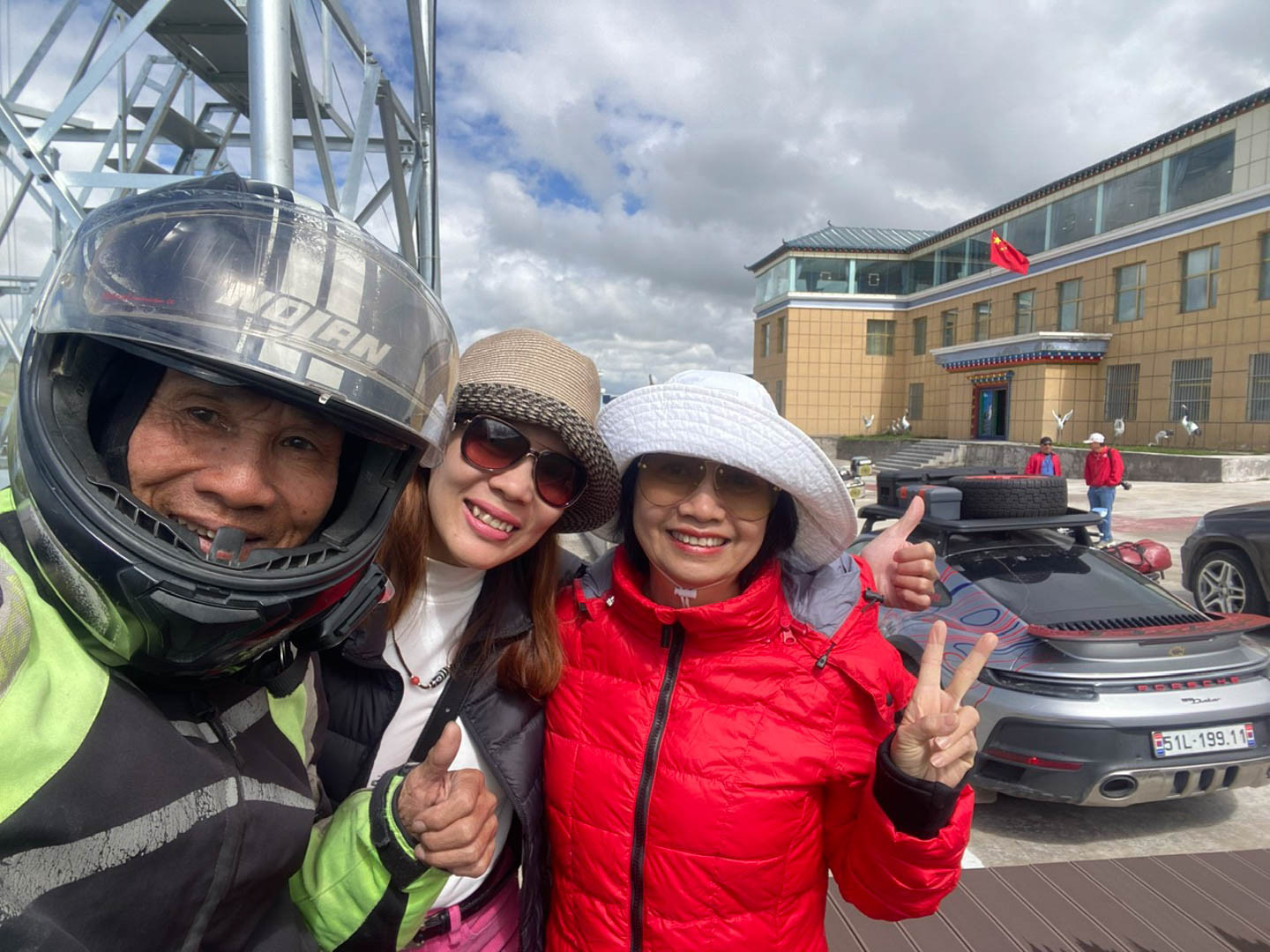
Semo La is a pass located in central Tibet that leads to the Changtang region. Also known as Provincial Road 206 (S206), it is a remote road through desolate mountains. At an elevation of 5,565 meters, Semo La is considered the highest paved road in the world.
At midnight, Mr. Hung and Ha reached the summit of the pass. The outside temperature was -3 degrees Celsius, with strong winds blowing. Mr. Hung found himself losing control, exhausted. He stopped by the roadside, sat down, and leaned against his motorcycle.
"Ha kept reminding me: ‘If you rest here, you’ll die from the cold.’ But I was too tired, knowing I couldn’t ride anymore, and if I did, I would crash. Ha handed me a chocolate bar. I could only nibble on half before stuffing it into my pocket and dozing off. About an hour later, I woke up feeling much more alert. Ha was visibly relieved as he had been preparing to call for international rescue," Mr. Hung recounted.
The two adventurers got back on their bikes and continued down the other side of the pass. They needed to arrive at the hotel before 7 AM to rejoin the group.
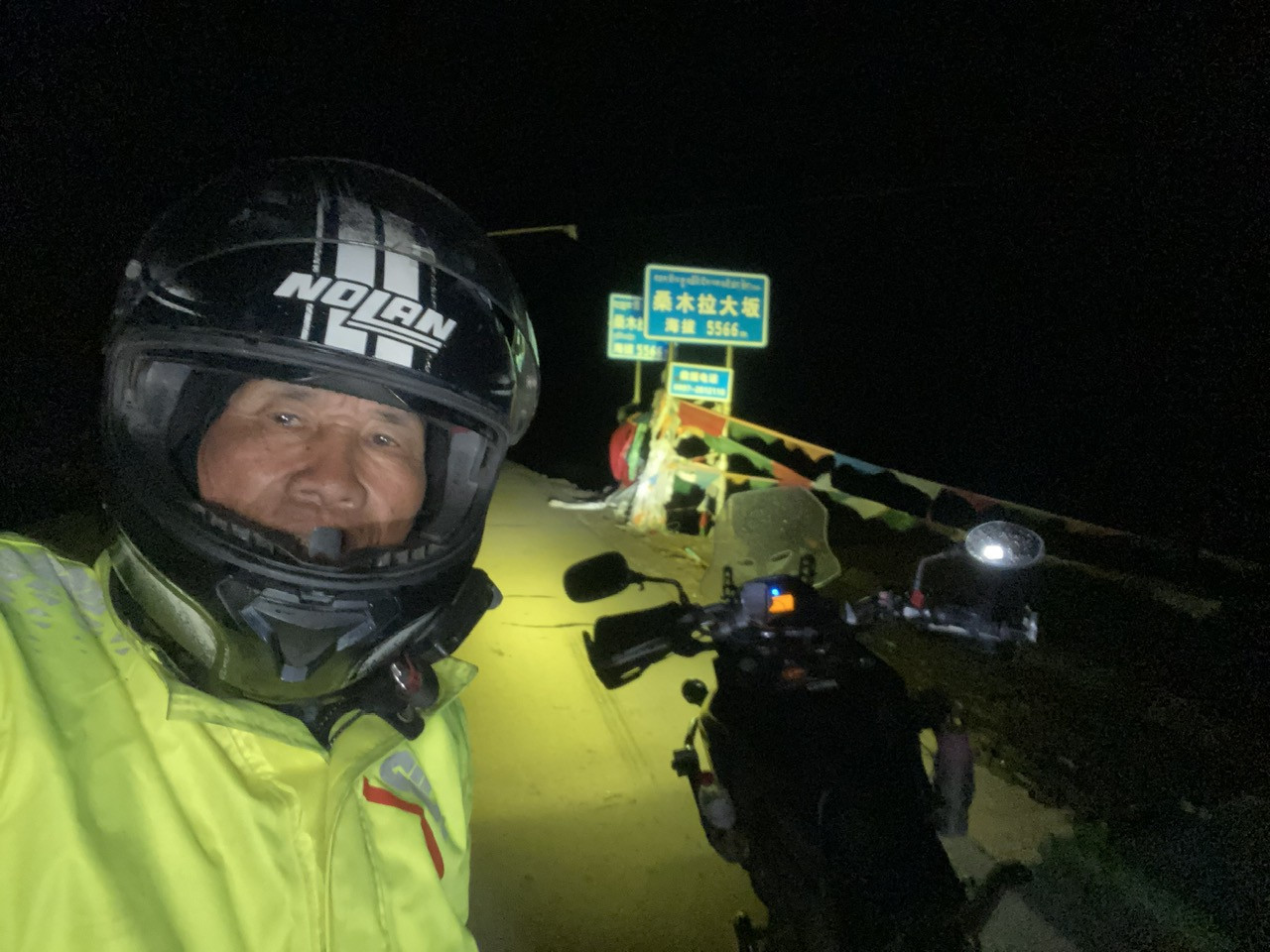
"There were no streetlights, so it was pitch black, with only the headlights of our bikes lighting the way. At one point, we hit a deep pothole, and I was thrown off the seat. At 3 AM, I noticed Ha’s headlights were getting farther away. I slowed down, and Ha said, ‘Uncle, I’m exhausted.’ He then parked his bike by the roadside and fell asleep on the seat for 30 minutes," Mr. Hung recounted.
When Ha woke up, daylight had begun to break. The two riders hurried to reach the rendezvous point. After completing the necessary procedures, they stayed at the hotel to catch up on sleep.
"It was hard, exhausting, and fraught with risks. There were moments when I thought I would collapse, but I overcame it all. I loved the journey, especially the beautiful villages nestled in the grasslands, mountains, and rivers, where people have preserved their traditional customs for generations," Mr. Hung reflected.

Photos courtesy of the character.
He was particularly struck by the Tibetan villages, where each house is surrounded by a thick layer of livestock dung—a symbol of wealth in the community.
"Most people here make a living by herding yaks and goats. The more dung piled around a house, the more livestock the family owns, indicating their prosperity. In Tibet, cow dung is not only a symbol of wealth but also an essential fuel source, replacing firewood," Mr. Hung explained.
"On a pass in the mystical land of Tibet, I encountered a group of Tibetans singing traditional songs. They sang with all their hearts amidst the majestic landscape. At that moment, even though I didn’t understand the language, the melody moved me deeply," Mr. Hung recounted, his voice tinged with emotion.
"I always cherish the emotions I experience on each journey. Whether at 20, 30, or 70, I still love life. In fact, as I pass 70, I find this is when love becomes the most beautiful. I will continue to live a disciplined life, swimming, meditating, and riding...
If I have the chance, I will embark on more long journeys to enjoy the beauty of life," the 71-year-old adventurer shared, his eyes gleaming with the excitement of future adventures.
Linh Trang